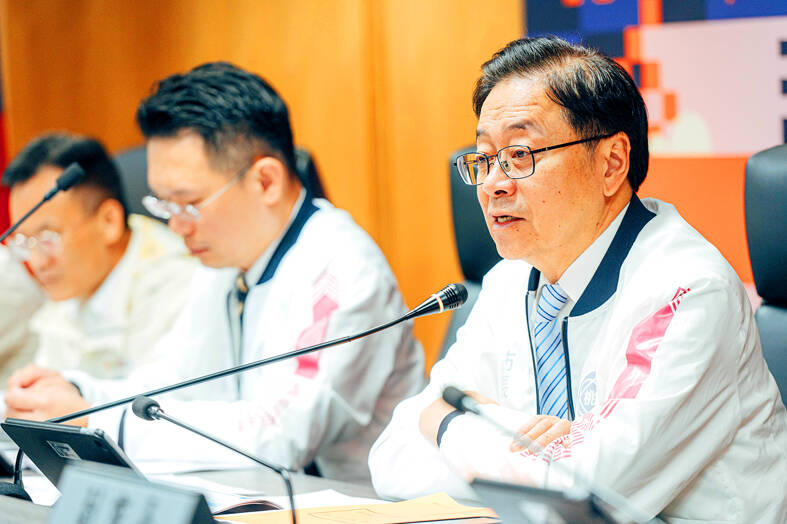Culture preservation groups and Taoyuan residents yesterday protested a decision by Chinese Nationalist Party (KMT) Taoyuan Mayor Simon Chang (張善政) to remove items from a local Shinto shrine, while academics said that Japanese who travel to Taiwan to worship fear that all the shrine’s deities might be removed.
Fu Jen Catholic University law professor Yao Meng-chang (姚孟昌) said that since Chang became mayor, the city government has restricted freedom of religion by targeting places of worship that are important to the community.
The deities are facing expulsion to Japan, Yao said, referring to a shrine on Hutou Mountain (虎頭山) in the city’s Taoyuan District (桃園).

Photo: CNA
Protesters called the removal a “crude destruction of a cultural treasure.”
Meng said that many foreigners, including Chinese and Thai Buddhists, as well as Hindus from India, have come to him voicing concern over the city’s removal of deities and their looming return to their countries of origin.
“They are worried that their deities, their worship, could be banned,” he said.
Figurines of deities that are predominantly worshiped by foreigners in Taiwan pose no threat to social order, but the Chang administration does not respect their right to have places of worship in Taoyuan, he said.
The city government’s policy seeks to erase the collective memory of local events, he said, calling its actions unethical.
The National Human Rights Commission and the Executive Yuan should investigate the matter, he said.
The statement came after days of protests near the shrine, with demonstrators holding signs with slogans such as: “The Constitution guarantees freedom of religion,” “Why can a Japanese deity not reside in a Japanese shrine?” and “The Taoyuan City Government violates my freedom to worship.”
One protester told reporters that the shrine is the best preserved place of Shinto worship in Taiwan, saying that it attracts many visitors on weekends, including cosplayers and amateur photographers.
The protests began after Chang said that people had complained about the shrine, announcing that some items, including figurines of the deity Amaterasu Okami, would be removed.
The Democratic Progressive Party (DPP) caucus in the Taoyuan City Council condemned the move, saying in a statement that the site, unlike many other Shinto shrines in Taiwan, was not dismantled in the 1950s because it was forcibly transformed into a martyrs’ shrine commemorating veterans of the Chinese Civil War.
It was reverted back to its original purpose under the administration of former Taoyuan mayor Cheng Wen-tsan (鄭文燦) of the DPP, but with KMT back in power, the city government has embarked on a mission of “cultural cleansing,” the DPP caucus said.
“Some KMT officials still strongly cling to their outdated, feudal viewpoints of being Chinese,” which motivated the Chang administration to work toward removing the shrine’s deities, the DPP officials said.

Taiwan is to have nine extended holidays next year, led by a nine-day Lunar New Year break, the Cabinet announced yesterday. The nine-day Lunar New Year holiday next year matches the length of this year’s holiday, which featured six extended holidays. The increase in extended holidays is due to the Act on the Implementation of Commemorative and Festival Holidays (紀念日及節日實施條例), which was passed early last month with support from the opposition Chinese Nationalist Party (KMT) and Taiwan People’s Party. Under the new act, the day before Lunar New Year’s Eve is also a national holiday, and Labor Day would no longer be limited

COMMITMENTS: The company had a relatively low renewable ratio at 56 percent and did not have any goal to achieve 100 percent renewable energy, the report said Pegatron Corp ranked the lowest among five major final assembly suppliers in progressing toward Apple Inc’s commitment to be 100 percent carbon neutral by 2030, a Greenpeace East Asia report said yesterday. While Apple has set the goal of using 100 percent renewable energy across its entire business, supply chain and product lifecycle by 2030, carbon emissions from electronics manufacturing are rising globally due to increased energy consumption, it said. Given that carbon emissions from its supply chain accounted for more than half of its total emissions last year, Greenpeace East Asia evaluated the green transition performance of Apple’s five largest final

Taiwan is to extend its visa-waiver program for Philippine passport holders for another year, starting on Aug. 1, Minister of Foreign Affairs Lin Chia-lung (林佳龍) said on Friday. Lin made the announcement during a reception in Taipei marking the 127th anniversary of Philippine independence and the 50th anniversary of the establishment of the Manila Economic and Cultural Office (MECO) in Taiwan, the Ministry of Foreign Affairs said. The decision reflected Taiwan’s commitment to deepening exchanges with the Philippines, the statement cited Lin as saying, adding that it was a key partner under the New Southbound Policy launched in 2016. Lin also expressed hope

Temperatures in New Taipei City’s Sindian District (新店) climbed past 37°C yesterday, as the Central Weather Administration (CWA) issued heat alerts for 16 municipalities, warning the public of intense heat expected across Taiwan. The hottest location in Taiwan was in Sindian, where the mercury reached 37.5°C at about 2pm, according to CWA data. Taipei’s Shilin District (士林) recorded a temperature of 37.4°C at noon, Taitung County’s Jinfeng Township (金峰) at 12:50 pm logged a temperature of 37.4°C and Miaoli County’s Toufen Township (頭份) reached 36.7°C at 11:40am, the CWA said. The weather agency yesterday issued a yellow level information notice for Taipei, New